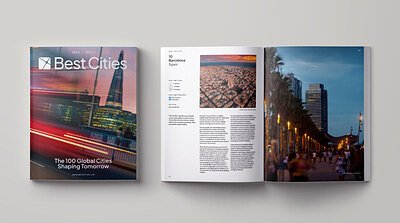
London Maintains Global Lead, But Resilience is the New City Metric
For the tenth consecutive year, London tops Resonance Consultancy’s World’s Best Cities ranking. But experts say adaptability and a focus on ‘livability’ – not just economic power – are becoming key to urban success.
London Maintains Global Lead, But Resilience is the New City Metric
By George Millen
For the tenth year running, London has claimed the top spot in Resonance Consultancy’s annual ranking of the World’s Best Cities, solidifying its position as a global powerhouse. But this year's report reveals a subtle shift in what defines urban success, with ‘resilience’ – the ability to adapt to economic, social, and environmental challenges – emerging as a crucial metric alongside traditional economic indicators.
Resonance’s methodology combines quantitative data – including economic performance, infrastructure, and environmental sustainability – with qualitative data derived from millions of online reviews and a survey of over 21,000 people. New York and Paris round out the top three, demonstrating the continued dominance of established global hubs. However, the report suggests that the cities best positioned for future success aren’t just those with strong economies, but those actively addressing the pressing issues of the 21st century.
Beyond Economic Might: The Rise of ‘Livability’
“For a long time, city rankings were heavily focused on GDP and financial indicators,” explains a senior analyst at Resonance who requested anonymity. “But we’re seeing a growing emphasis on ‘livability’ – the quality of life for residents, access to green spaces, cultural attractions, and a sense of community. Cities that prioritize these aspects are attracting and retaining talent, which is essential for long-term growth.”
This shift is reflected in the performance of cities beyond the traditional top tier. While London continues to excel in economic performance and boasts a thriving cultural scene, it’s increasingly focusing on sustainability initiatives, like expanding its ultra-low emission zone and investing in public transportation. Similarly, New York is investing heavily in green infrastructure projects and community-based initiatives. Paris, a perennial favorite, is committed to becoming a ‘15-minute city,’ where residents can access essential services within a short walk or bike ride.
Resilience in a Turbulent World
The report comes at a time of heightened global uncertainty, with cities facing unprecedented challenges from climate change, political instability, and economic shocks. “The cities that are best prepared for these challenges are those that have diversified economies, robust social safety nets, and strong community engagement,” says a researcher specializing in urban resilience. “They’re also investing in infrastructure that can withstand extreme weather events and are actively working to reduce their carbon footprint.”
Indeed, resilience isn’t just about weathering storms; it’s about proactively preparing for them. London, for example, has invested heavily in flood defenses and is working to improve air quality. New York is implementing a comprehensive climate resilience plan, while Paris is leading the way in sustainable urban planning.
Beyond the Top Three: Emerging Urban Centers
While London, New York, and Paris continue to dominate the rankings, several emerging urban centers are gaining ground. Cities like Amsterdam, Barcelona, and Melbourne are consistently recognized for their high quality of life, sustainable practices, and thriving cultural scenes. These cities are demonstrating that it’s possible to achieve economic success while prioritizing environmental sustainability and social equity.
“These cities are often smaller and more manageable than the megacities,” explains an urban planner. “They’re also more focused on creating a sense of community and fostering a vibrant local culture. This is attracting a new generation of residents and businesses who are looking for a more balanced and fulfilling lifestyle.”
However, the report cautions that these cities also face challenges, including rising housing costs and increasing tourism. Addressing these issues will be crucial to ensuring their long-term sustainability and resilience.
The Future of Cities: A Holistic Approach
Resonance’s latest ranking underscores the importance of taking a holistic approach to urban development. Cities can no longer rely solely on economic indicators to measure their success. They must also prioritize environmental sustainability, social equity, and the quality of life for their residents.
“The cities that will thrive in the future are those that are adaptable, innovative, and committed to creating a more sustainable and equitable world,” says the Resonance analyst. “They’re not just building cities; they’re building communities.”
As global challenges continue to mount, the ability to adapt and build resilience will become increasingly crucial. The cities that recognize this and prioritize the well-being of their residents will be best positioned to thrive in the decades to come. The ranking isn’t just a list of the ‘best’ cities, but a roadmap for creating more livable, sustainable, and resilient urban centers around the world. The future of cities is not just about economic growth; it’s about creating a better future for all.
